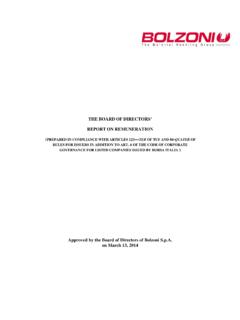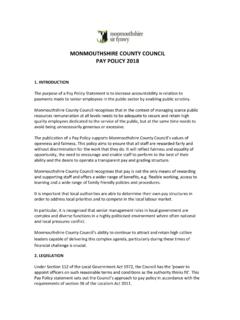Transcription of REMUNERATION POLICY Remuneration Policy
1 PACIFIC CAPITAL UCITS FUNDS PLC (THE COMPANY ) REMUNERATION POLICY 1. Introduction The Company, which is authorised as an Undertaking for Collective Investment in Transferable Securities under the European Communities (Undertakings for Collective Investment in Transferable Securities) Regulations 2011, as amended by the Central Bank (Supervision and Enforcement) Act 2013 (Section 48(1)) (Undertakings for Collective Investment in Transferable Securities) Regulations 2015 is required to establish, implement and maintain a REMUNERATION POLICY (the REMUNERATION POLICY ) which is in accordance with the requirements of Articles 14a and 14b of the Regulations. This REMUNERATION POLICY is aimed at ensuring that any relevant conflicts of interest can be managed appropriately at all times and sets out practices for those categories of staff, including senior management, risk takers, control functions, and any employees receiving total REMUNERATION that takes them into the same REMUNERATION bracket as senior management and risk takers, whose professional activities have a material impact on the risk profile of the Company, that are consistent with and promote sound and effective risk management and do not encourage risk-taking which is inconsistent with the risk profiles, rules or instruments of incorporation of the Company.
2 This REMUNERATION POLICY is in line with the business strategy, objectives, values and interests of the Company and the investors in the Company and includes measures to avoid conflicts of interest. 2. Definitions The following definitions are deemed to apply for the purposes of this POLICY : Regulations Means the European Communities (Undertakings for Collective Investment in Transferable Securities) Regulations 2011, as amended by the Central Bank (Supervision and Enforcement) Act 2013 (Section 48(1)) (Undertakings for Collective Investment in Transferable Securities) Regulations 2015. Board Means the board of directors of the Company. ESMA Guidelines Means the ESMA Guidelines on sound REMUNERATION policies under the UCITS Directive and the AIFMD (2015/ESMA/1172).
3 Investment Manager Means Pacific Capital Partners Limited. Business Plan Means the business plan of the Company which supports and forms part of the Company s application for authorisation as a UCITS under the Regulations, as may be amended or updated from time to time. UCITS Means an Undertaking for Collective Investment in Transferable Securities 2 3. Identified staff The Regulations require the Company to identify the categories of staff whose professional activities have a material impact on the risk profile of the Company. The Company is controlled and managed by the Board, but does not currently have any staff. Accordingly, the identified staff for the purpose of this REMUNERATION POLICY are the Board.
4 4. Variable REMUNERATION The directors who are also employees of the Investment Manager do not receive any REMUNERATION in respect of their services as directors of the Company. The other directors receive fixed REMUNERATION in respect of their services which is set at a level determined by the Board as a whole and which is not performance related. None of the directors are currently in receipt of variable REMUNERATION in respect of their services as directors of the Company. Accordingly, the detailed provisions of Article 14b of the UCITS Directive and the related ESMA Guidelines in relation to variable REMUNERATION are not applicable to the Company. None of the directors are currently in receipt of a pension from the Company.
5 The Company has determined that the fixed REMUNERATION payable to the directors who are not employees of Investment Manager is (a) consistent with sound and effective risk management and does not encourage risk-taking which is inconsistent with the risk profile, rules or instrument of incorporation of the Company and (b) in line with the business strategy, objectives, values and interests of the Company and the investors in the Company. The nature of the directors REMUNERATION , being fixed and not including any variable component and being determined by the Board as a whole, ensures that the Company appropriately manages any conflicts of interest in respect of REMUNERATION . 5. REMUNERATION committee The UCITS Directive requires self-managed investment companies that are significant in terms of their size, their internal organisation and the nature, scope and complexity of their activities to establish a REMUNERATION committee.
6 Having considered these criteria, the Company has determined, on advice of counsel, that it is not significant in these respects and has not established a REMUNERATION committee. 6. Delegation The Board has delegated certain activities, as specified in its Business Plan, in respect of the investment management and risk management of the Company, to the Investment Manager. It is intended that once final guidance is available from ESMA and confirmation is obtained that the REMUNERATION requirements under the UCITS Directive will also apply to delegates, the Company will liaise with the Investment Manager in relation to the application of the REMUNERATION requirements under UCITS Directive to the Investment Manager, where necessary.
7 7. Annual review On an annual basis the Board will review the terms of this REMUNERATION POLICY and assess whether its overall REMUNERATION system operates as intended and is compliant with the obligations on REMUNERATION POLICY as set out in the UCITS Directive. The REMUNERATION POLICY will be updated by the Board as and when required. 8. Effective date The effective date of this POLICY is 18 March 2016.







